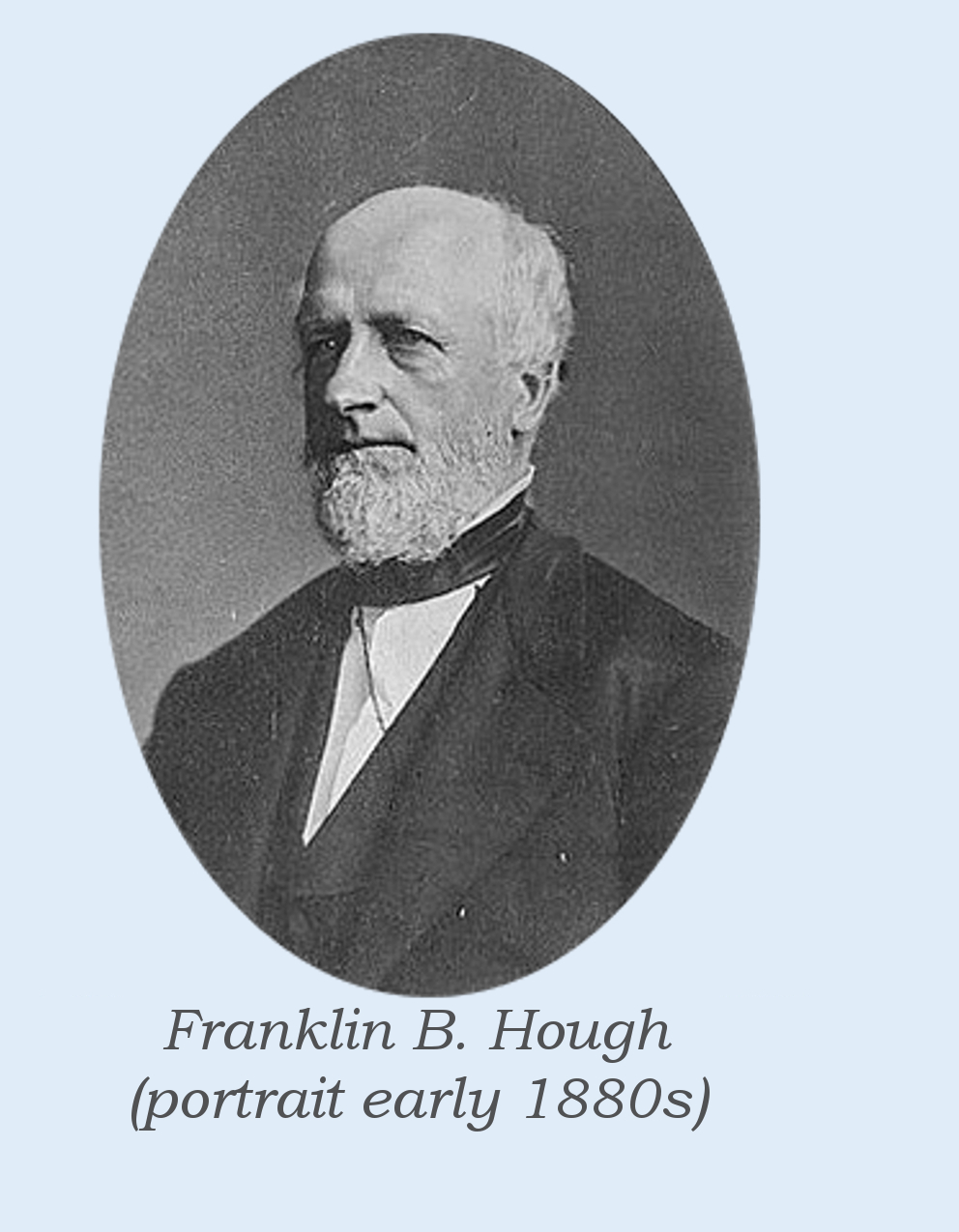
Franklin B. Hough
 Biography
BiographyFranklin Benjamin Hough (1822–1885), the son of Dr. Horatio Gates Hough and Martha Pitcher Hough, was a scientist, historian and the first chief of the United States Division of Forestry, the predecessor of the United States Forest Service. Among the first to call attention to the depletion of forests in the U.S., he is sometimes called the “father of American forestry.”
Hough was born in Martinsburg, New York, and as a young man showed an interest in mineralogy and long hikes. He graduated with a degree from Union College in Schenectady in 1843, and in 1846 he was married to Maria Eggleston of Champion, New York, and a daughter was born, Lola. He also published the first of his major scientific writings, A Catalogue of Indigenous, Naturalized, and Filicord Plants of Lewis Counties, New York. In 1848, he received an M.D. from Western Reserve College. The same year, Maria died. In 1857, he had a son, Romeyn Beck Hough, who would also go on to pursue a career in botany and medicine. He was elected as a member to the American Philosophical Society in 1882.
After starting his career with a medical practice, in 1852 he stepped down from that to concentrate on research and literary pursuits. In 1854 Hough was appointed as superintendent of the 1855 New York State census, the first complete census of the state, and then in 1861, with the advent of the American Civil War, Hough worked as an inspector for the United States Sanitary Commission. In 1862 he enlisted as a surgeon in the 97th New York Volunteer Infantry. Ten years after supervising the 1855 New York State census, Hough returned to the job of overseeing the 1865 state census. Reviewing the returns, he noted with alarm a declining trend in the availability of timber. Finding additional evidence in the federal census of 1870, which he also supervised, he presented a paper entitled On the Duty of Governments in the Preservation of Forests to the 1873 meeting of the American Association for the Advancement of Science in Portland, Maine. Hough argued that Mediterranean countries had harmed the environment by excessive harvests of trees, and that a similar problem faced the United States. He proposed regulation of the use of forests and the establishment of forestry schools. In 1881 the Division of Forestry was created within the Department of Agriculture, with Hough as its first chief. In 1883, Secretary of Agriculture George B. Loring replaced Hough, whom he disliked, with Nathaniel Egleston. Hough died in Lowville on June 11, 1885.
Bibliography
A Catalogue of Indigenous, Naturalized, and Filicord Plants of Lewis Counties, New York (1846)
A History of St. Lawrence and Franklin Counties, New York (1853)
A History of Jefferson County in the State of New York (1854)
A Narrative of the causes which led to Philip’s Indian War of 1675 and 1676 (1858)
Diary of the Siege of Detroit in the War with Pontiac (1860, editor)
A history of Lewis County, in the state of New York (1860)
On Military and Camp Hospitals (1862, translator)
History of Duryee’s Brigade (1864)
Washingtoniana: Or, Memorials of the Death of George Washington (1865)
On the Duty of Governments in the Preservation of Forests (1873, scientific paper)
Report on Forestry (1877 official report to U.S. government)
Elements of Forestry (1882)
Other links
Forest History Society
New York State Library
Wikipedia